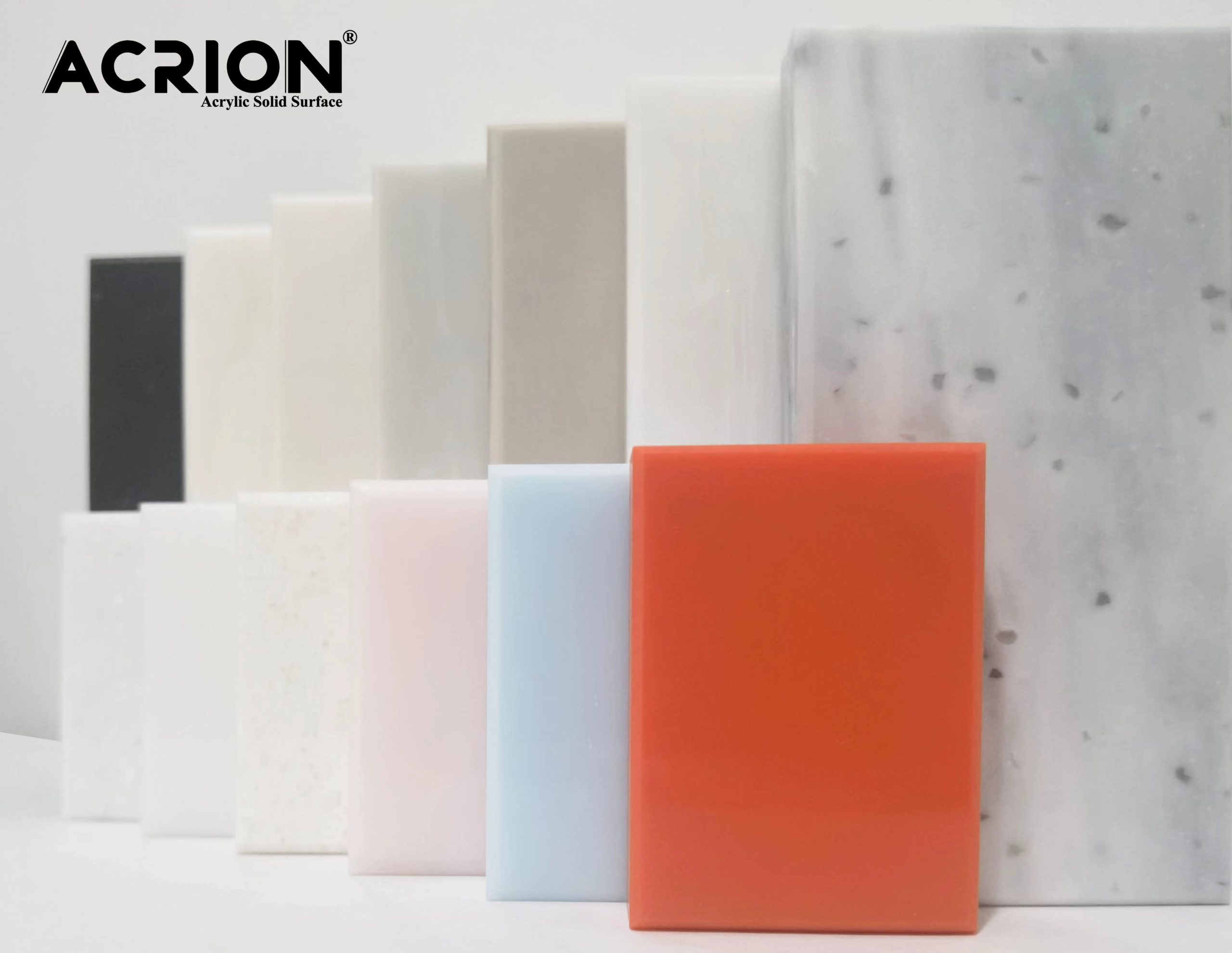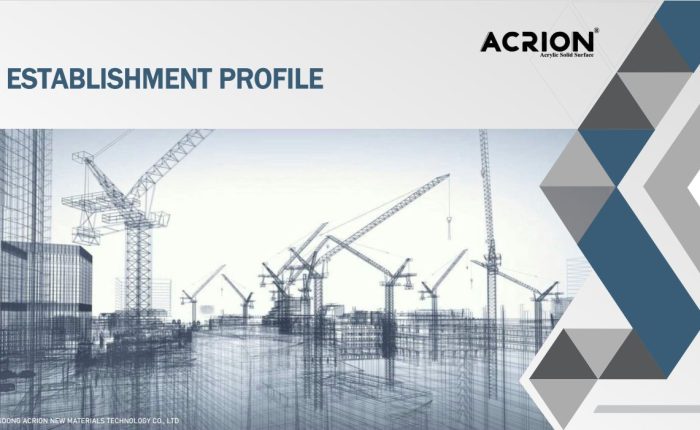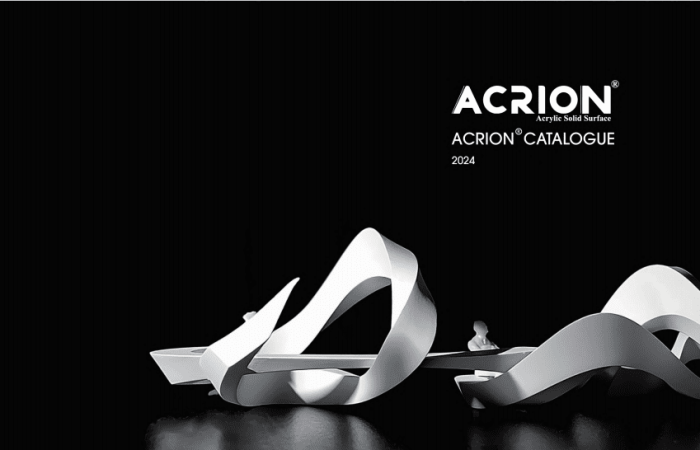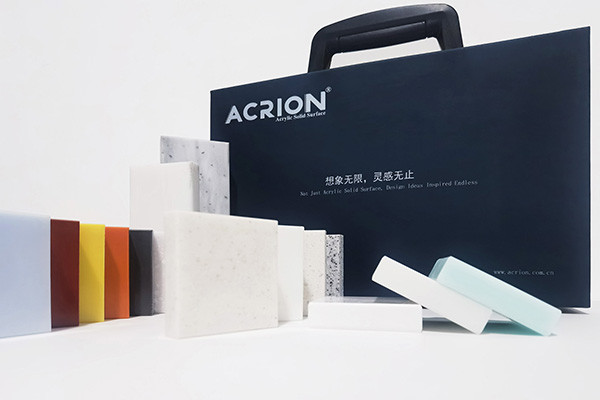Acrion vs. Sintered Stone-Arbeitsplatten: Ein detaillierter Vergleich für informierte Entscheidungen
Bei der Auswahl von Arbeitsplatten für Küchen oder Badezimmer verstehen Sie die Unterschiede zwischen Akrion und Sinterstein (allgemein bekannt als “Felsplatte” auf Chinesisch) ist entscheidend. Beide Materialien bieten einzigartige Vorteile und Herausforderungen, wodurch sie für verschiedene Anwendungen geeignet sind, die auf Entwurfspräferenzen, funktionalen Anforderungen und Wartungserwartungen basieren.
Materialzusammensetzung und Herstellungsprozess
Akrion: Eine Mischung aus Acryl und Mineralien
Acrion ist ein massives Oberflächenmaterial, das DuPont in den 1960er Jahren erfunden hat. Es besteht aus Acrylpolymer (etwa 40%) und natürlichen Mineralien wie Aluminium -Trihydrat (etwa 55%), wobei Pigmente (etwa 5%) für die Farbe zugesetzt werden. Diese homogene Mischung erzeugt eine nicht poröse, nahtlose Oberfläche, die in verschiedene Formen und Konstruktionen geformt werden kann. Der Herstellungsprozess ermöglicht die Anpassung in Bezug auf Farbe, Textur und Muster und macht Acrion sowohl für moderne als auch für traditionelle Innenräume zu einer vielseitigen Wahl.
Gesintertes Stein: für Kraft und Ästhetik entwickelt
Sintered Stein ist ein High-Tech-Material aus natürlichen Mineralien wie Ton, Feldspat und Siliciumdioxid. Diese Rohstoffe sind extremer Druck (über 15.000 Tonnen) und hohe Temperaturen (1200–1500 ° C) in einem Prozess bezeichnet, der die natürliche Bildung von Stein über Millionen von Jahren nachahmt. Das Ergebnis ist ein dichtes, nicht-poröses Material mit außergewöhnlicher Festigkeit, Haltbarkeit und Widerstand gegen Wärme, Kratzer und Flecken. Sintered Stein ist in einer Vielzahl von Farben und Mustern erhältlich, einschließlich Designs, die sehr aussässigem Stein, Beton oder Metall ähneln.
Ästhetische Anziehungskraft und Designflexibilität
Acrion: nahtlose Integration und Anpassung
Die feste Oberfläche von Acrion ermöglicht unsichtbare Nähte und erzeugt ein schlankes, einheitliches Erscheinungsbild. Es kann in Kurven geformt oder in Waschbecken für ein Flüssigkeitsdesign integriert werden. Während Acrion eine Vielzahl von Farben und Mustern bietet, sind seine Designs im Vergleich zu Sinterstein im Allgemeinen subtiler und gleichmäßiger. Die Fähigkeit des Materials, thermoformiert zu werden, ermöglicht die Erstellung von einzigartigen Formen und Kanten und verleiht jedem Raum einen Hauch von Eleganz.
Sinteriger Stein: Realistischer Stein und mutige Muster
Sintered Stone zeichnet sich aus, um die natürliche Schönheit des Steins zu replizieren, mit Optionen, die von marmorähnlicher Age bis hin zu kühnen, zeitgenössischen Mustern reichen. Die großformatischen Platten (bis zu 3200 x 1600 mm) verringern die Notwendigkeit von Nähten und sorgen dafür, dass sie ideal für weitläufige Oberflächen wie Kücheninseln oder Badezimmerwaschtische ist. Die Fähigkeit des Materials, in ultradünnen Profilen (so dünn wie 3 mm) herzustellen, eröffnet neue Möglichkeiten für leichte, moderne Designs.
Haltbarkeit und Widerstand gegen den täglichen Verschleiß
Akrion: Mäßige Haltbarkeit bei Reparierbarkeit
Acrion ist mäßig langlebig, aber anfälliger für Kratzer und Schnitte im Vergleich zu Sinterstein. Während es den täglichen Gebrauch standhalten kann, können scharfe Objekte oder schwere Auswirkungen Markierungen hinterlassen. Die Reparierbarkeit von Acrion ist jedoch ein wesentlicher Vorteil - Minor -Kratzer können oft mit Sandpapier ausgelöst werden, wodurch der ursprüngliche Finish wiederhergestellt wird. Das Material ist auch hitzebeständig, aber nicht hitzebeständig, sodass Trivetten oder heiße Pads für heiße Töpfe und Pfannen empfohlen werden.
Gesintertes Stein: Außergewöhnliche Festigkeit und geringe Wartung
Sintered Stone gehört zu den haltbarsten verfügbaren Arbeitsplatten. Seine hohe Dichte und Härte (MOHS -Skala von 6–7) machen es resistent gegen Kratzer, Chips und Risse. Das Material ist auch sehr hitzebeständig und kann ohne Beschädigung direkter Exposition gegenüber hohen Temperaturen standhalten. Zusätzlich ist Sinterstein nicht porös, wodurch das Wachstum von Bakterien verhindert und die Notwendigkeit einer Versiegelung beseitigt wird. Die Bedürfnisse mit geringer Wartung machen es zu einer hervorragenden Wahl für geschäftige Haushalte oder kommerzielle Umgebungen.
Langfristige Wartungsanforderungen
Acrion: Regelmäßiges Polieren für dauerhaften Glanz
Acrion erfordert minimale Wartung, profitiert jedoch vom regelmäßigen Polieren, um seinen Glanz aufrechtzuerhalten. Vermeiden Sie Schleifreiniger, die die Oberfläche im Laufe der Zeit stumpf können. Verwenden Sie stattdessen ein mildes Waschmittel und ein weiches Tuch zum täglichen Reinigen. Bei tieferen Flecken kann eine nicht abrasive Reinigungspaste angewendet werden. Acrions nicht-poröse Natur erleichtert es einfach zu reinigen, aber es wird eine sofortige Aufmerksamkeit für Verschüttungen empfohlen, um eine Färbung zu verhindern.
Sinteriger Stein: Mühelosen Unterhalt mit routinemäßiger Reinigung
Die nicht poröse Oberfläche von Sintered Stone macht es außergewöhnlich einfach zu reinigen. Ein einfaches Wischen mit Seife und Wasser reicht normalerweise aus, um Schmutz und Schmutz zu entfernen. Im Gegensatz zu Naturstein erfordert gesinterte Stein keine Versiegelung oder spezielle Behandlungen, wodurch langfristige Wartungskosten gesenkt werden. Sein Widerstand gegen Flecken, Kratzer und Wärme sorgt für jahrelang mit minimalen Anstrengungen weiter.
Umweltauswirkungen und Nachhaltigkeit
Akrion: Recycelbar und niedrigem In seiner Aufnahme
Acion wird unter Berücksichtigung von Nachhaltigkeit hergestellt und enthält nach Möglichkeit recycelte Materialien. Es ist auch Greenguard -zertifiziert für niedrige chemische Emissionen, die zu einer gesünderen Innenluftqualität beitragen. Am Ende seines Lebens kann Acrion in neue Produkte recycelt werden, wodurch der Abfall reduziert wird. Darüber hinaus stellt seine Haltbarkeit sicher, dass es jahrzehntelang funktionsfähig bleibt und die Notwendigkeit häufiger Ersatzminderungen minimiert.
Gesinterte Stein: umweltfreundliche Produktion und Langlebigkeit
Der Produktionsprozess von Sintered Stone soll die Umweltauswirkungen minimieren, wobei einige Hersteller recycelte Materialien in ihren Formulierungen verwenden. Die Langlebigkeit des Materials verringert den Ersatzbedarf und speichert die Ressourcen weiter. Sintered Stone ist ebenfalls zu 100% recycelbar, und seine nicht-poröse Natur verhindert das Wachstum von Schimmel oder Bakterien, was zu einem gesünderen Lebensumfeld beiträgt.
Eignung für verschiedene Anwendungen
Acrion: Ideal für benutzerdefinierte Designs und integrierte Funktionen
Die Flexibilität von Acrion macht es perfekt für benutzerdefinierte Designs wie gebogene Arbeitsplatten oder nahtlose Waschbecken. Es ist auch eine beliebte Wahl für Waschtische und Wandverkleidungen für Badezimmer aufgrund seines Feuchtigkeitsbeständigkeit und der einfachen Reinigung. Acrions Fähigkeit, thermoformiert zu werden, ermöglicht kreative Anwendungen wie abgerundete Kanten oder einzigartige Formen, was es zu einem Favoriten unter Designern macht, die die Grenzen überschreiten möchten.
Gesintertes Stein: vielseitig und leistungsstark
Die Stärke und den Wärmebeständigkeit von Sintered Stone machen es sowohl für Innen- als auch für Außenanwendungen geeignet, einschließlich Küchenarbeitsplatten, Bar -Tops und sogar Kaminumgebung. Die breite Palette von Farben und Mustern stellt sicher, dass es jeden Designstil ergänzt, von traditionell bis modern. Sintered Stone's großformatige Platten sind auch zu einer hervorragenden Wahl für groß angelegte Projekte wie Handelsgebäude oder öffentliche Räume, in denen Haltbarkeit und Ästhetik gleichermaßen wichtig sind.



